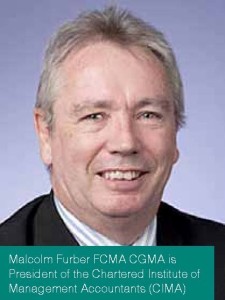 Malcolm Furber FCMA CGMA is President of the Chartered Institute of Management Accountants (CIMA), the definitive professional body representing accountants in executive roles worldwide. He spoke to Accountant magazine about the organisation’s role as a Championof thought leadership and the ever-broadening management remit of the senior finance professional.
Malcolm Furber FCMA CGMA is President of the Chartered Institute of Management Accountants (CIMA), the definitive professional body representing accountants in executive roles worldwide. He spoke to Accountant magazine about the organisation’s role as a Championof thought leadership and the ever-broadening management remit of the senior finance professional.
In the GCC nations, there is no statutory requirement for SMEs to work with a qualified accountant to produce their accounting materials. So is there as much interest in – and traction for – a CIMA qualification in this part of the world?
The reality is that there is extremely keen interest in this part of the world -more and more businesses are aware that in order to compete globally, they must invest in qualifiedprofessionals. The role of online media is an important factor in this sea-change: there is no strictly local business anymore, and you have to buy-in to global benchmarks and expectations. As an indicator of this interest and commitment, I’ve just chaired a CIMA convocation event that was attended by 220 students -an absolutely full house! Our presence in the GCC markets is currently going through exponential growth.
We continually see the role of the CFO, for example, changing to embrace leadership activities and highly proactive engagement with IPO and M&A activities. How is CIMA aligned with this new direction?
The first thing I should say is that we see critical activities such as thought leadership to be verymuch ‘our space’ -we are totally aligned with expanding the sphere of influence of the finance professional through adaptive thinking, and helping organic growth into a full leadership role. This is why our certification agendas include the development of strong leadership skills, strong marketing skills – and the ability to sell a concept to the Board. We are also pioneers when it comes to innovating the accountancy disciplines themselves, leading the way with techniques such as predictive analytics, predictive accounting and the role of Big Data. These are aspects that can transform the power and efficiency of the enterprising business and our membership is seen as pre-eminent in understanding these trends and empowering their companies accordingly.
How do you see the role of Regulation in setting criteria and enabling a level playing field?
CIMA has consistently lobbied for stronger regulation in key markets across the globe. The right level of regulation is crucial. For example,when we polled our membership internationally about what they see as the No.1 business risk, 74 per cent replied that it is the lack of relevant regulation in certain markets. On the other hand,we’ve all experienced over-regulated marketsand sectors, and the last thing we would want to do is stifle entrepreneurism and creativethinking -there’s a lot of truth in the phrase ‘over-regulate, under-perform.’ Our business is improving performance -and the right style and level of regulation is a catalyst for good performance.
CIMA has an enviable reputation for the strong presence of its membership across both private and public sectors -can you tell us a little more about this?
It’s a remarkable fact that we actually have more members in government departments than CIPFA has! (The Chartered Institute of Public Finance and Accountancy). The reality isthat the generic strength of the CIMA training is equally applicable in any working environment – and I would add that the ethical standards we embrace are especially important in terms of appeal to government entities and publicly-listed companies.This combination of core financial skills and code of ethics can in fact take you anywhere. Recently, I was contacted bya CIPFA member based inAustralia, who had recently qualified, and he said: “My only question is, where do I go from here?’ My reply is: “Where can’t you go?” You see, one of the great things about a CIMA qualificationis its ability to open doors andempower your career in any area you are interested in.
Related to this, tell us something about yourself, Malcolm?
In many ways, I’m a classic example of the power of the CIMA brand to build your careerand help you assess financial issues in a way that’s rigorous, relevant and adds to the bottomline. I’m not a graduate -I came up through the vocational route. It was only much later in life that I had the opportunity to study at Princeton and London Business School. I worked at world-class organisations such as ICI and BOC, and later undertook major consultancy projects for multinationals looking to build market share in fresh markets. Throughout this career -I’ve just turned 60 -I’ve never lost sight of the fact that the right qualifications are not only keyto an individual’s personal progress, but tothe performance of the organisation you are employed by. It’s a crucial part of the CIMA remit that the training we provide has a worldwide validation and value -and I’m immensely proud to take on the role of President and be at the helm while we navigate through a climate that has such immense promise for the future.












